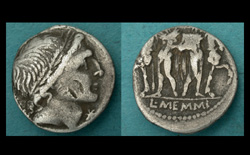Ave!
Dioscurias, City Issue, Caps of Castor & Pollux, late 2nd Century BC, Very Rare!
Æ 17mm/4.3gm
Con/ The obverse struck just off center on a typically short flan for these issues, otherwise, Good Very Fine. Dark chocolate brown patina.
Obv/ The twin caps of Castor and Pollux, both topped with an eight pointed star.
Rev/ ΔΙΟΣ / ΚΟΥΡΙΑ / ΔΟΣ (= DIOSCURIAS) in three lines, flanking a thyrsus.
Ref/ BMC Black Sea 1021-1023; SNG Stancombe 638.
Seller's Note/ All of the above is what you'll normally read from other sellers, but as we here at NRC believe that you should really know about the coins you plan to purchase.
Circa the 5th Century, the Greeks, most from Milltus, began to found trading colony's into the Black Sea. On the eastern shore, which was known in ancient times as Colchis (Jason and his Argonauts). Not many years later, the Greeks founded the city of Dioscouris, naming it after their patron deities, the Dioscuri, Castor and Pollux . The latter was called Sebastopolis by the Romans and Byzantines.
Castor and Pollux were twin brothers in Greek and Roman mythology. Together they are called the Dioscuri. They were the sons of Queen Leda of Sparta. Their twin sisters were Helen of Troy and Clytemnestra. Castor and Pollux were changed into the constellation called Gemini. Tyndareus, the king of Sparta, was the father of Castor, which made Castor mortal, while Zeus was the father of Pollux which made him a demigod.
One of the best-known myths with Castor and Pollux is how they became a constellation. During a battle, Castor, being mortal, was killed. Heartbroken at the death of his brother, Pollux prayed to Zeus to make Castor immortal which meant Pollux would have to give up half of his immortality. Eventually, Zeus agreed to the request, and so Castor and Pollux were transformed into the Gemini constellation. To balance the cosmos, the Dioscuri would only be on Olympus one half of the year, and the other six months would be spent in the Underworld in the Elysium fields.
They became the gods of sailing and horsemanship. ... Pollux and Castor were also known for their boxing abilities and were thus the gods of athletes and athletic competitions. In both art and literature, Pollux and his brother were shown with horses, as the two were famed horsemen.
As seen on the reverse of this coin, in Ancient Greece a thyrsus was a wand or staff of giant fennel covered with ivy vines and leaves, sometimes wound with taeniae (ribbons) topped with a pine cone, artichoke, fennel, or by a bunch of vine-leaves and grapes or ivy-leaves and berries, carried during Hellenic festivals and religious ceremonies.The thyrsus is typically associated with the Greek god Dionysus, and represents a symbol of prosperity, fertility, and hedonism similarly to Dionysus.
The final photo features a Maenad using her thyrsos to ward off a Satyr, Attic red-figure kylix, c. 480 BC. Ouch!





